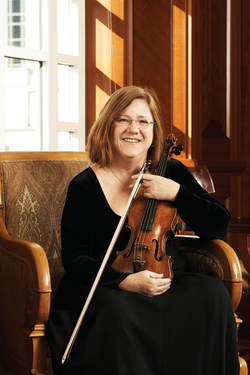The 54th ICSOM Conference was held August 24-27, 2016 at the Loews Madison Hotel in Washington DC. Our hosts were ICSOM’s resident orchestras of the John F. Kennedy Center for the Performing Arts—the National Symphony Orchestra and the Kennedy Center Opera House Orchestra—and their local, the Metropolitan Washington DC Federation of Musicians, Local 161-710.
Last year in Philadelphia, ICSOM held a new volunteer event before the conference. Again this year, a number of delegates and guests, along with Local 161-710 president Ed Malaga, participated by performing and serving dinner at the Central Union Mission near the Capitol building on Tuesday, August 23. That evening another pre-conference event, the Negotiating Orchestras Workshop, was held. Delegates from orchestras that settled their agreements this past season, as well as those in the midst of negotiations, gave reports to attendees. The workshop was moderated by ICSOM President George Brown and ICSOM Counsel Kevin Case.
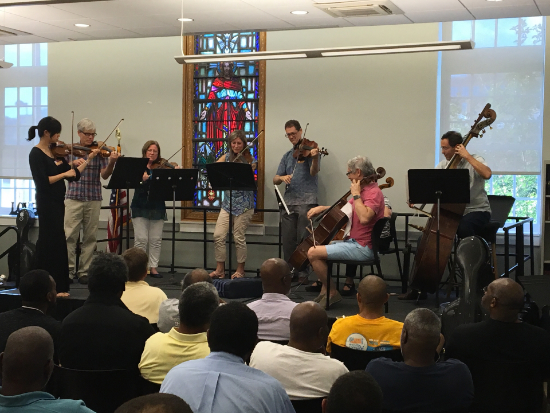
Jennifer Kim (National), Greg Mulligan (Baltimore), the Author (Nashville), Anne Marie Brink (Dallas), Steve Flanter (Hawaii), John Koen (Philadelphia), Debbie Brooks (Fort Worth), and Ed Malaga (Local 161-710) perform at the Central Union Mission
Photo credit: Bruce Ridge
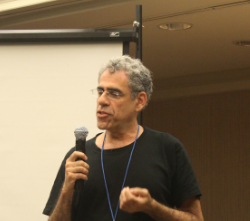
Delegate Ken Mirkin (New York Philharmonic) presenting during the Negotiating Orchestras Workshop
Photo credit: Dan Sweeley
One additional event is held prior to the official beginning of the conference—the new delegate breakfast. An ICSOM conference can be overwhelming to first-time delegates because so much information is included during the four days of meetings that there isn’t a lot of time to stop and explain things to newer members. This breakfast allows the governing board to meet face-to-face with the new delegates and give them information about their duties and to share essential information in a smaller setting.
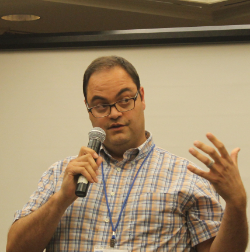
Delegate Albert Suarez (Kansas City) presenting during the Negotiating Orchestras Workshop
Photo credit: Dan Sweeley
Wednesday morning, ICSOM Chairman Bruce Ridge welcomed delegates, alternate delegates, orchestra members, Local and AFM officers and staff, and guests to Washington DC. He introduced the ICSOM Governing Board and ICSOM Secretary Laura Ross read the roll call of orchestras (it is read every morning of the conference) at which time delegates introduced themselves and other orchestra members and Local officers joining them at the conference. After a number of local speakers offered their greetings, the Chairman and President each addressed the conference.
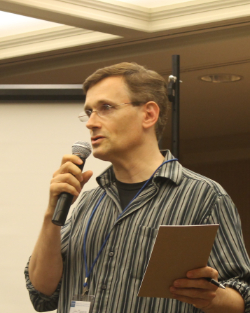
Delegate John Hagstrom (Chicago Symphony) presenting during the Negotiating Orchestras Workshop
Photo credit: Dan Sweeley
This was Bruce Ridge’s final address following a decade of service as chairman. During his tenure, Ridge has battled negative publicity and doom and gloom scenarios aimed at our orchestras. He has traveled the country visiting orchestras and sharing the good news about orchestras: many orchestras have seen impressive increases in contributions, large donations, ticket sales, and audience attendance, and many have also achieved improvements and salary increases in their negotiation settlements. Ridge also met with Local officers, attended rehearsals and/or concerts, and when possible, also met with many staff executives and board leaders. He made a point of sharing the same good news about orchestras with these leaders and reminded them of all the good works orchestras do within their communities. Ridge was also a proponent of “breaking the fourth wall” in which musicians were encouraged to engage face-to-face with donors and audience members, so they could know musicians as more than just the performers on stage.
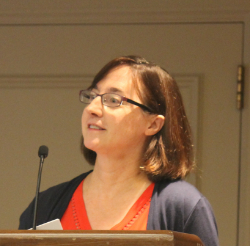
Delegate Barb Corbato (Grand Rapids) reporting on recently concluded negotiations
Photo credit: Dan Sweeley
Reports by the Grand Rapids Symphony and the San Antonio Symphony covered their recent difficult negotiations. The Fort Worth Symphony’s report covered the musicians’ activities and expectation of a strike that would follow the past 15 months of fruitless negotiations.
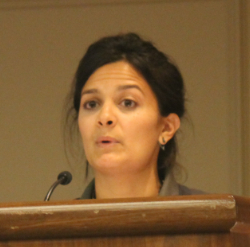
Delegate Marisa Bushman (San Antonio) reporting on recently concluded negotiations
Photo credit: Dan Sweeley
The Conference was truly international this year with reports from musicians from orchestras in Australia, the Netherlands, and England, who shared how their orchestras are run and financed. Additionally, General Secretary of the International Federation of Musicians (FIM) Benoît Machuel spoke about the upcoming FIM Orchestra Conference that will be held in Montreal, Quebec, in May 2017.
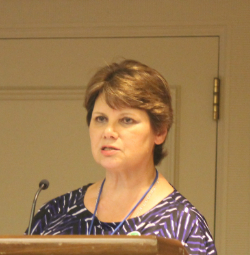
Delegate Debbie Brooks (Fort Worth) reporting on ongoing negotiations
Photo credit: Dan Sweeley
The AFM was well represented at the conference: Legislative-Political Director Alfonso Pollard, who is based in Washington DC, spoke about his lobbying efforts on behalf of musicians; International President Ray Hair reminisced about his history with the Fort Worth Local and Fort Worth Symphony; and Symphonic Services Division (SSD) staff and counsel participated in a moderated panel discussion. SSD negotiator and Audition Hotline administrator Nathan Kahn, who retires from the AFM in the next few weeks after more than 28 years of service, addressed the conference and received a standing ovation for his service.
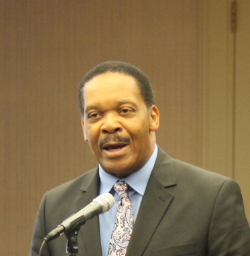
AFM Legislative-Political Director Alfonso Pollard
Photo credit: Dan Sweeley
There were additional reports covering ICSOM business, and there were addresses from executive officers of the National Symphony Orchestra, the Washington National Opera, and the John F. Kennedy Center for the Performing Arts. Randy Whatley, who has attended the past three conferences, shared information in a presentation and breakout session to help musicians engage with donors. In his first conference as ICSOM Counsel, Kevin Case gave an informative presentation on bullying in the workplace, and also held a breakout session with Federal Mediator Javier Ramirez. A third breakout Q&A session, with AFM-SSD electronic media director Debbie Newmark, covered information about the Integrated Media Agreement.
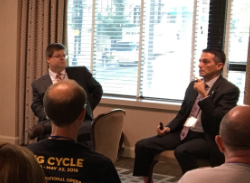
ICSOM Counsel Kevin Case and FMCS Mediator Javier Ramirez
Photo credit: Dan Sweeley
A highlight on the first day of the conference was a concert by musicians of the National Symphony and Kennedy Center Opera House Orchestra on the Millennium Stage at the Kennedy Center. A reception at the hall followed the concert. Earlier that day, John Beder had shared results of a survey on performance anxiety that hundreds of ICSOM members completed last fall as follow up to a 1978 ICSOM survey on the same topic. On the final day of the conference, the first 20 minutes of Beder’s documentary Composed was exhibited; the completed film will be available for exhibition on college campuses beginning in October following its debut at Boston University. This film addresses an important topic for any musician that is either preparing to or is actively working in our field. I encourage ICSOM members and their students to see Composed if it comes to your area.
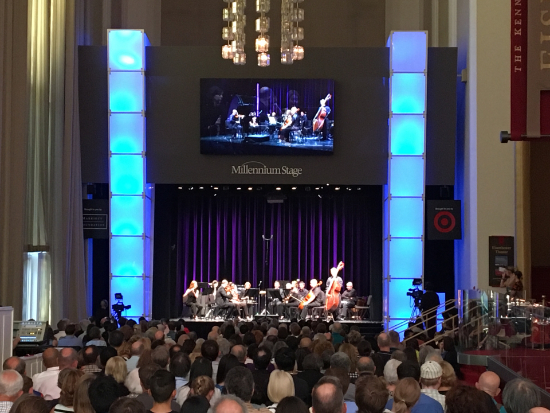
Millennium Stage Concert
Photo credit: Bruce Ridge
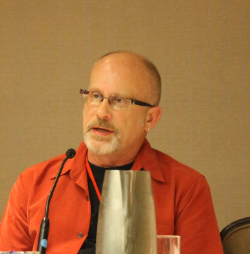
Mac Whitley
Photo credit: Dan Sweeley
Another topic of interest during the conference was covered in two sessions the second day of the conference. Orchestras are performing many more pops programs these days with artists who are amplified at levels that can damage hearing and adversely affect people physically. Two sound engineers—Mac Whitley, chief sound engineer at the Tennessee Performing Arts Center in Nashville, TN, and
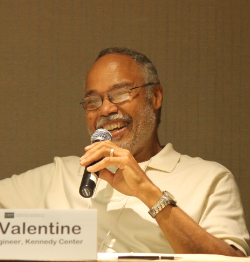
DC Valentine
Photo credit: Dan Sweeley
DC Valentine, a Washington-based sound engineer at the John F. Kennedy Center for the Performing Arts—were invited to answer questions and discuss what control, if any, orchestra musicians could have over onstage levels. A second presentation was by Dr. Heather Malyuk, whose employer, Sensaphonics Hearing Conservation, focuses on musicians’ hearing issues (see page 6). She related interesting information about average decibel levels of symphony instruments, types of hearing loss, questions to ask during a yearly hearing exam, and the use of earplugs and in-ear monitors. She also discussed problems and options for musicians choosing hearing aids, since most are designed to hear speech rather than extreme highs and lows in music.
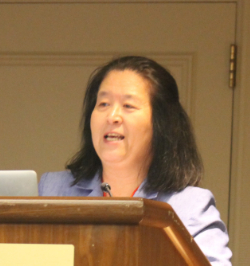
Wendy Cheng
Photo credit: Dan Sweeley
The second presenter, Wendy Cheng, founder of the Association of Adult Musicians with Hearing Loss (AAMHL), spoke about cochlear implants and the use of assistive listening devices. Much useful information was shared during these presentations.
Orchestra delegates spent time together in four smaller groups with their assigned Members-at-Large, and the Town Hall Meeting allowed delegates to raise issues of concern to their orchestras.
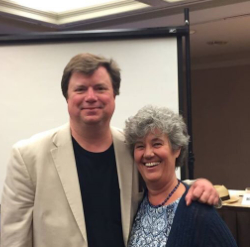
Outgoing and incoming ICSOM Chairs
Photo credit: Brian Rood
Meredith Snow, a violist with the Los Angeles Philharmonic, was elected ICSOM Chair by acclamation. While thanking delegates for their support, Snow shared her vision of a more inclusive paradigm that promotes dialog and encourages creative solutions where there is division. Treasurer Michael Moore, Senza Sordino Editor Peter de Boor, and Member-at-Large Paul Gunther were all re-elected. There were two more Member-at-Large positions available due to Snow’s election and Jennifer Mondie’s decision to step down at the end of the conference. Several rounds of balloting ultimately resulted in the election of Dan Sweeley from the Buffalo Philharmonic, and Kimberly Tichenor from the Louisville Orchestra as the two new Members-at-Large. The President, Secretary, and fourth Member-at-Large positions held by George Brown, Laura Ross, and Paul Austin (respectively) were not up for election this year.
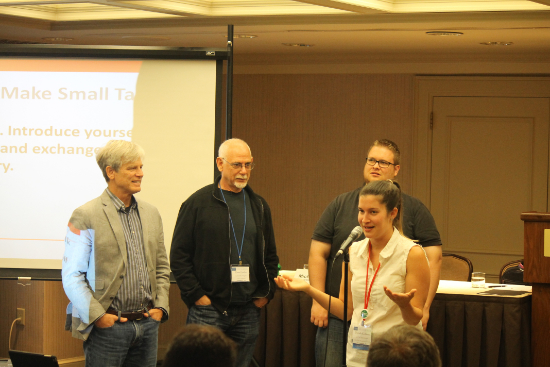
Acknowledged extroverts Greg Mulligan (Baltimore), Brian Gordon (Phoenix), Doug Rosenthal (Kennedy Center) and Danielle Kuhlmann (San Diego) demonstrate Randy Whatley’s techniques for interacting with donors
Photo credit: Dan Sweeley
Adopted resolutions on the final day can be found on pages 9-11. The resolutions honored Lew Mancini, Antoinette Follett, Susan Martin, Nathan Kahn, Carla Lehmeier-Tatum, Tom Mendel, and Jennifer Mondie. Another resolution honored Bruce Ridge for his service as Member-at-Large and President, and his decade as ICSOM’s Chairman.
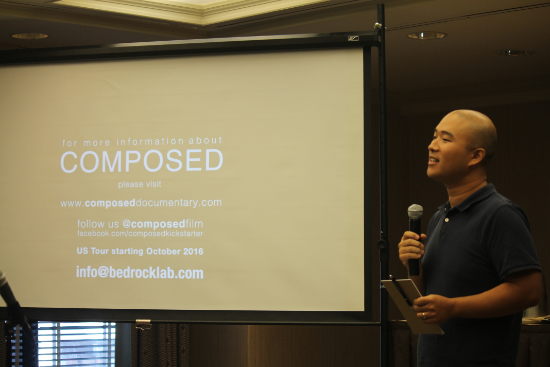
John Beder introduces a preview of his film
Photo credit: Dan Sweeley
Additional resolutions thanked film maker John Beder for his work on the documentary Composed, encouraged musicians to continue spreading the good news about orchestras through social media, and called on orchestra managers to identify ways to better protect their musicians performing onstage during amplified concerts. In addition, following adoption of Resolution 20 at the AFM Convention this past June, the conference adopted a resolution calling on orchestra managers to end the practice of unequal pay for subs and extras.
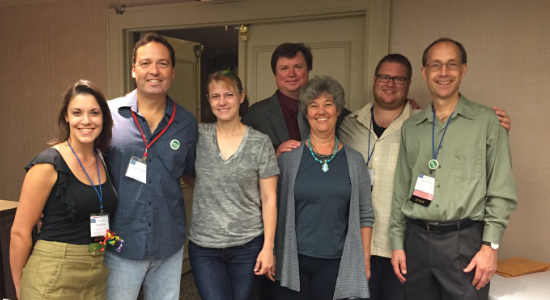
Hosts and Chairs: Conference Coordinator Danielle Wilt (National) with Ed Malaga, Jennifer Mondie, Bruce Ridge, Meredith Snow, Doug Rosenthal, and Peter de Boor (not pictured: Steve Wilson (National))
Photo credit: Paul Castillo
The 2017 Conference is scheduled from August 23-26, 2017 and will be hosted by the Buffalo Philharmonic and Local 92 in Buffalo, New York.
(Video and text of the ICSOM Chairman’s and President’s addresses, additional conference addresses, various PowerPoint and pdf presentations, and handouts, and conference photo galleries can be found on the ICSOM website, www.icsom.org. Current ICSOM members must be registered on the ICSOM website to view most of the conference documents.)
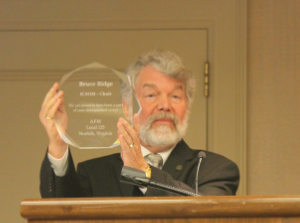
Local 125 (Norfolk, VA) President John Lindberg unveils a plaque honoring outgoing ICSOM Chair Bruce Ridge
Photo credit: Dan Sweeley


